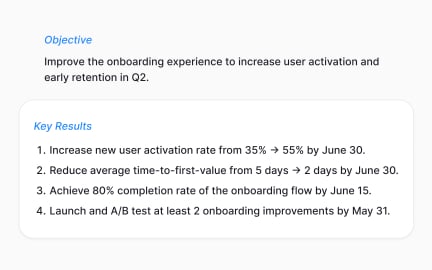SMART Goal Setting
SMART goals are specific, measurable, achievable, relevant, and time-bound objectives used to focus product work and track results.
What is SMART Goal Setting?
Your team objectives lack clarity and accountability because goals are vague aspirations without specific success criteria, making it impossible to measure progress or determine whether efforts are generating meaningful results toward strategic objectives.
Most professionals set general goals without systematic frameworks for defining success criteria and measurement approaches, missing opportunities to create accountability and focus that drive consistent progress toward important outcomes and strategic priorities.
SMART goal setting is a systematic approach to defining objectives using Specific, Measurable, Achievable, Relevant, and Time-bound criteria that create clear success standards and accountability frameworks for individual and team performance optimization.
Teams using SMART goals achieve 60% better goal completion rates, 45% improved accountability, and significantly higher performance because objectives are defined clearly rather than left to interpretation and hoping progress happens without systematic tracking.
Think about how successful organizations use SMART goals to align team efforts around specific outcomes with clear deadlines, or how performance management systems use structured goal setting to create accountability and measure contribution to strategic objectives.
Why SMART Goal Setting Matters for Achievement Success
Your efforts don't generate consistent progress because goals lack specific success criteria and accountability frameworks, leading to busy work that might not contribute meaningfully to strategic objectives and competitive advantage development.
The cost of vague goal setting compounds through every effort that could be optimized for better results. You waste time on activities that don't move important metrics, miss opportunities to focus resources strategically, and lose competitive advantage when goal achievement is inconsistent and unmeasurable.
What effective SMART goal setting delivers:
Better focus and resource allocation because specific goals eliminate ambiguity about what success looks like, enabling teams to concentrate effort on activities that actually drive progress toward defined outcomes and strategic priorities.
When goals are SMART, daily decisions become easier because team members can evaluate whether activities contribute to specific objectives rather than just staying busy without strategic direction.
Enhanced accountability and performance measurement through measurable criteria that enable objective evaluation of progress and contribution rather than subjective assessment that might not reflect actual achievement and strategic impact.
Improved team coordination and alignment because shared SMART goals create common understanding of success criteria and individual responsibilities that enable effective collaboration toward strategic objectives.
Stronger motivation and achievement satisfaction as specific goals with clear deadlines create urgency and enable celebration of concrete accomplishments rather than vague progress that doesn't feel rewarding.
More effective strategic planning and execution through goal setting that connects individual and team objectives to broader organizational strategy and competitive positioning requirements.
Advanced SMART Goal Setting Strategies
Once you've established basic SMART goal capabilities, implement sophisticated goal management and performance optimization approaches.
Cascading SMART Goals and Organizational Alignment: Connect individual SMART goals to team and organizational objectives rather than isolated goal setting that might not serve broader strategic priorities and competitive positioning.
Dynamic SMART Goal Adjustment and Adaptive Planning: Update SMART goals based on changing conditions and new information rather than rigid goal commitment that might not serve strategic success when circumstances evolve.
Cross-Functional SMART Goal Coordination: Align SMART goals across different teams and departments rather than independent goal setting that might create conflicts and missed collaboration opportunities.
Performance Analytics and SMART Goal Optimization: Use goal achievement data to improve future goal setting and performance management rather than just individual goal tracking without systematic improvement and optimization.
Step 1: Define Specific Objectives and Success Criteria (Week 1)
Establish clear, unambiguous goals that describe exactly what will be accomplished rather than general aspirations that could be interpreted differently by different team members and stakeholders.
This creates SMART goal foundation based on precise outcomes rather than vague objectives that might not provide clear direction for daily decision-making and resource allocation priorities.
Step 2: Establish Measurable Metrics and Progress Indicators (Week 1)
Define quantitative or qualitative measures that indicate progress and success rather than goals that can't be evaluated objectively, enabling systematic tracking and course correction when necessary.
Focus measurement on outcomes that actually matter for strategic success rather than just convenient metrics that might not reflect genuine progress toward important objectives and competitive advantages.
Step 3: Ensure Achievability and Resource Alignment (Week 1-2)
Validate that goals can be accomplished with available resources, capabilities, and time constraints rather than setting unrealistic objectives that create frustration and demotivation when achievement proves impossible.
Balance ambitious objectives with practical feasibility to ensure goals stretch performance without creating impossible expectations that undermine team confidence and strategic execution.
Step 4: Confirm Relevance to Strategic Priorities (Week 2)
Verify that goals contribute meaningfully to broader organizational objectives and competitive positioning rather than just interesting activities that might not serve strategic success and market advantage development.
Step 5: Set Time-Bound Deadlines and Milestone Tracking (Week 2)
Establish specific completion dates and interim checkpoints that create urgency and enable progress monitoring rather than open-ended objectives without accountability timelines and measurement schedules.
This ensures SMART goals generate achievement momentum rather than just well-defined objectives that don't create action and consistent progress toward strategic outcomes and competitive advantages.
If SMART goals don't improve achievement rates, examine whether goals address priorities that actually matter for strategic success rather than just activities that are easy to measure without strategic impact.
The Problem: SMART goals that become bureaucratic exercise rather than performance improvement tool, creating administrative overhead without proportional improvement in achievement and strategic execution effectiveness.
The Fix: Focus SMART goal setting on objectives that actually drive strategic success rather than just systematic goal documentation that might not improve performance and competitive positioning significantly.
The Problem: Goals that meet SMART criteria technically but don't inspire motivation or connect to meaningful outcomes that team members care about achieving and contributing toward.
The Fix: Balance SMART structure with compelling vision and purpose that motivates achievement rather than just technical goal criteria without emotional engagement and strategic significance.
The Problem: SMART goal tracking that focuses on measurement compliance rather than strategic progress and achievement that actually matters for business success and competitive advantage.
The Fix: Use SMART criteria to enhance goal achievement rather than just meeting goal setting requirements, ensuring structure serves performance improvement and strategic execution effectiveness.
Create SMART goal setting approaches that drive strategic achievement rather than just systematic objective definition that might not improve performance and competitive positioning meaningfully.
Recommended resources
Courses

UX Research

HTML Foundations








